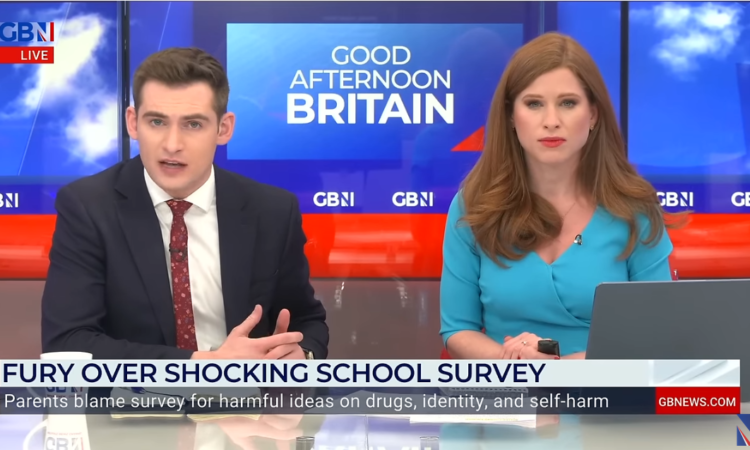
GB News has uncovered an alarming survey distributed to children as young as 11 years old in secondary schools across the UK. The survey, intended to gather insights into students’ health and well-being, includes controversial questions about illegal drug use, self-harm, and gender identity, sparking outrage among parents and experts.
The survey, published by the Schools and Students Health Education Unit, asks children if they have ever taken drugs to get high, listing 17 different substances—some of which parents say their children may have never heard of.
Questions also probe deeply into gender identity, asking, “Is your gender the same as the sex you were assigned at birth?” Furthermore, students are given options for how they cope with stress, including harmful behaviors like self-harm or drinking alcohol.
Lisa McKenna, a parent who contacted GB News, expressed her shock:
“My 11-year-old daughter came home confused, asking why someone would hurt themselves when feeling sad. These questions could plant dangerous ideas in children’s minds.”
McKenna described difficulties in accessing the survey, stating that parents were only informed through a generic email and required to book an appointment to view the content. After persistent efforts, she was given access and was horrified by what she read:
“There are vulnerable and impressionable children in schools who might take these suggestions seriously. The survey could do more harm than good.”
Miriam Cates, a Member of Parliament and former teacher, condemned the survey as inappropriate:
“Exposing children to ideas like self-harm, drug use, or gender confusion can normalize these behaviors. Children aren’t mini-adults. They shouldn’t be burdened with issues that they lack the emotional maturity to process.”
Cates highlighted a broader issue of psychological contagion, where behaviors like self-harm or drug use can spread among peer groups when introduced inappropriately.
Surrey County Council defended the survey as a “tried and tested holistic approach” to understanding young people’s well-being. They stated that the questions on self-harm and substance abuse are standardized and necessary to identify issues and provide support:
“We prefer pupils encounter these topics in a supportive environment with trained staff who can address concerns and dispel myths.”
The survey provider emphasized that participation is voluntary, and parents can opt their children out if they feel the content is inappropriate.
The revelation has ignited debate about whether such surveys are beneficial or potentially harmful. Critics argue that these questions could inadvertently introduce harmful ideas to young minds, while supporters claim they provide essential data to address mental health and social issues.
GB News is inviting viewers to share their thoughts:
“Would you feel comfortable with your child answering such a survey at school?




